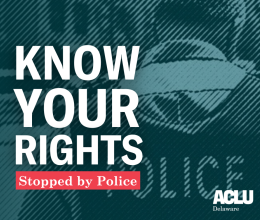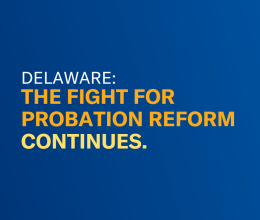On February 18, 2014, the Sixth Amendment Center released a report entitled The Crucible of Adversarial Testing: Access to Counsel in Delaware’s Criminal Courts, detailing their findings from a statewide evaluation of Delaware's right to counsel services. In the report, the Sixth Amendment Center reveals that under Delaware's current legal practices, "systemic impediments clear out thousands of defendants each year who should be receiving representation under the Sixth Amendment, but that are not."
The Delaware Public Defender's Office, which commissioned the study, organized a in conjunction with the report's release, where ACLU of Delaware Executive Director Kathleen MacRae made the following statement:
The ACLU applauds the Office of the Public Defender for commissioning this study of Delaware’s indigent defense system by the Sixth Amendment Center. We honor the expertise and dedication of the lawyers who serve as public defenders and conflict counsel. We admire the strong leadership that Public Defender Brendan O’Neill and his team provide, doing essential work with limited resources, and commend the immediate steps they have taken to rectify some of the problems that have been identified.
Reading this report has been an eye opening experience for me. This detailed analysis is instructive for all of us who operate both inside and outside the criminal justice system. For it is only an outsider’s perspective that can effectively and objectively evaluate the policy, procedures and operational culture of Delaware’s criminal justice system that has built up over the last fifty years. My hope is that it will guide us to vastly improve our system of indigent defense here in Delaware.
The ACLU is profoundly concerned that the core constitutional right to counsel is being denied to hundreds, if not thousands, of Delawareans every year. The denial of these rights means that more and more of our neighbors must confront the power and authority of the police, the prosecutors in the attorney general’s office, and the courts alone, without an informed, experienced advocate at their side. These individuals being denied their rights are poor and already the least powerful and most vulnerable members of our society. They are the unemployed, the disabled, the mentally ill and, more often than not, people of color. Yet when they plead guilty to a crime, no matter how minor, so that they can get back home to their kids or not lose the minimum wage job they do have, they live with a criminal record, and the collateral consequences that accompany that criminal record, for the rest of their lives.
For too long, the Delaware criminal justice system has valued economy and efficiency over the constitutional rights of the individual. It is time for these priorities to shift. There is no one specifically to blame for where we are today, but it is time for government officials and the networks they oversee to take responsibility for the changes that must come next. And it is clear that those changes must be considered and implemented at every level of government, from the Governor’s Office to the General Assembly, the courts and the Public Defender’s Office itself.
I have been invited to represent the ACLU on the advisory committee that Public Defender O’Neill has organized to evaluate and help advocate for the systemic changes needed to meet constitutional standards. The ACLU looks forward to assisting in every way possible to improve Delaware’s system of indigent defense."
For more information, read the executive summary of the report. A copy of the full report can also be found here.









